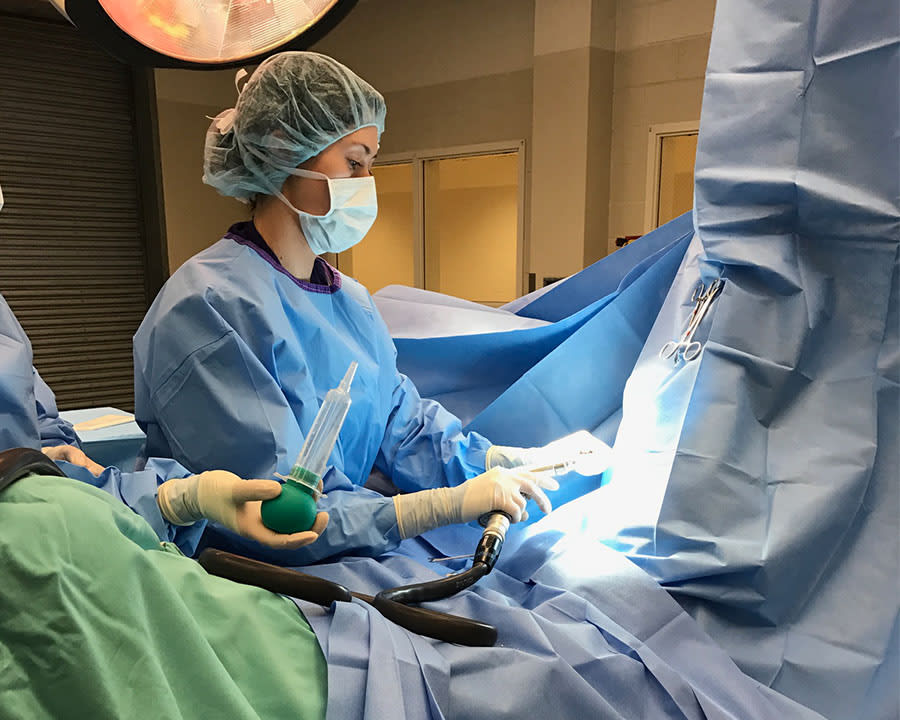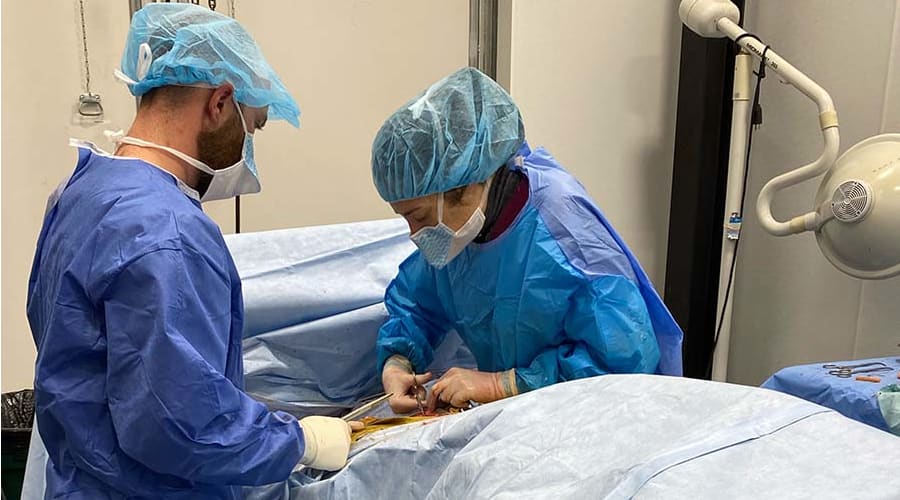Surgical Services
At our hospital in Poulsbo our equine surgeons, Dr. Cori Youngblood and Dr. Mackenzie Adams offer various equine surgeries including orthopedic and soft tissue surgery.
We practice the most stringent surgical protocols and have prioritized the capacity to perform life-saving emergency surgery, guided by our dedication to our clients and surrounding referring veterinarians.
We recognized the geographical limitations of equine surgery in the area and we have worked hard to provide this service for our patients.

What To Expect With A Surgical Case
We always keep you fully informed about why we are recommending a surgical procedure, the length of recovery, and any post-operative care your horse will need at home.
Surgical Procedures at Sound Equine Veterinary Hospital
We perform elective and emergency surgeries to help treat diseases and conditions in horses or to repair injuries sustained through trauma.
Our veterinarians routinely perform the following elective and non-elective surgeries:
- Colic Surgery
Colic surgery is the most common soft tissue surgery that we perform. Our vets can assess your horse's condition and offer surgical solutions if it is in the best interest of your horse.
Between Dr. Younglood and Dr. Adams, we strive to be available 24/7 to accommodate your horse's need for emergency surgery.
- Urogenital Surgery
A full range of urogenital surgical procedures can be carried out either at your farm through our ambulatory services, or for more complex procedures, by our specialist surgeons at our hospital. These include:
Mares: Cesarean section and other reproductive surgical emergencies are available along with the removal of endometrial cysts. Urogenital surgery, including Caslick's operation and other perineal surgery, repair of uterine torsion, correction of foaling injuries, and removal of bladder stones.
Colts/Stallions: We perform castration and correction of inguinal hernias. We also offer urogenital surgery, including cryptorchid surgery (removal of retained testicles), amputation of the penis, and removal of bladder stones.
- Arthroscopy/Tenoscopy
Arthroscopy is a minimally invasive technique used by equine surgeons to evaluate and treat diseases within joints. Similar techniques are also used to evaluate and treat diseases within tendon sheaths and bursae.
A narrow, rigid instrument called an endoscope is placed through a small incision to examine the inside of a joint, tendon sheath, or bursa. The image is then transmitted to a camera for viewing on a monitor. Specially designed surgical instruments are passed through separate small incisions to assist in the treatment of disease within these structures.
- Laceration Repair
Wounds occur when living tissue has been cut, broken, burnt, torn, or otherwise damaged.
These wounds must be cleaned, disinfected, and appropriately cared for by a qualified veterinarian as soon as possible.
- Sinus Surgery
The most commonly seen surgical sinus procedures are mass removal and procedures in conjunction with dental disease. Most of these procedures are done standing.
- Hernia Repair
Horses may be born with a hernia or develop one due to trauma. Our veterinarians can determine if surgical correction is necessary.
- Enucleation
This is the removal of an eye. This surgery is sometimes necessary due to trauma or chronic disease. Removal of the eye resolves the horse's pain and the vast majority of horses do very well with a single eye.
- Neurectomy
Neurectomy is the cutting of a nerve. This procedure is most commonly done for chronic conditions of the foot but is sometimes also done for high suspensory desmitis.
Cutting of the nerve removes pain for 6 months to many years.
- Mass Removal
This ranges from the removal of the smallest lump using cryotherapy to removing masses as large as a basketball.
Do not underestimate the potential seriousness of a small lump or bump. Consider a biopsy immediately.
The Surgery Process
We understand that the prospect of equine surgery can be frightening. Please be assured that we recommend surgery only when it is in your horse's best interests.
Our equine surgeon and our team are specially trained to handle the complicated needs of equine surgery. You can trust that we will do everything we can to make the process safe and comfortable for your horse.
-
Standing Surgery vs. General Anesthesia
Many large animal surgeries are performed on standing, awake patients and are typically to repair traumatic injuries, such as lacerations. Other common procedures are reproductive surgery, upper respiratory tract surgery, and minor hoof and lower leg procedures.
There are certain cases where standing surgery simply cannot be performed, such as colic surgery. Our veterinary team has extensive experience with equine surgery and anesthesia and will do everything they can to reduce risks.


